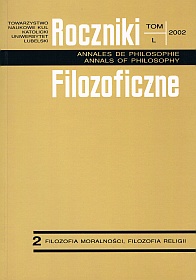„Sens i smak Nieskończoności” − Henryka Elzenberga via negativa
Abstrakt
The paper discusses Henryk Elzenberg's views on religion and mysticism, as they are scattered in his essays and critical writings, especially in his intellectual diary Kłopot z istnieniem [A Trouble with Existence]. The author relates his evolution of thought in the context of the philosopher's biography. He was first interested in epistemology and axiology (ethics and aesthetics) and then got involved in religious and mystic quest. The type of intuitive knowledge through participation in the object, which eludes positive and conceptual definitions, is called by Elzenberg intusception. The religious perspective affects also his relation to values. Initially, it was treated as a universal system of perfect determinants of ethical action and aesthetic experiences. In later Elzenberg's axiology they took on religion meaning, as metempirical and transrational signs − symbols − of Infinity (Indeterminacy). Eventually, this „religion of values” gives way to mysticism of negation, individual and solitary, in which the leading role is played by the „sense and taste of Infinity”. The author puts forward an interpretative hypothesis i.e. Henryk Elzenberg's via negativa was undoubtedly inspired by his Buddhist reading list. It may be traced to Jewish cabalistic tradition, although the author of A Trouble with Existence never refers to this source.
Bibliografia
Aniszczenko E.: Kulturalizm Henryka Elzenberga, „Zeszyty Literackie”, 1996, nr4(56), s.114-118.
Aniszczenko E.: Myśl namiętna i zahamowana. Rzecz o Henryku Elzenbergu, Wrocław: „W Kolorach Tęczy” 1997.
Chrzanowski G. OP: „Przezwyciężyć raczej siebie niż los”. Mistyczny stoicyzm Elzenberga, „Znak”, 1994, nr 2 (475), s.93-102.
Człowiek wobec wartości w filozofii Henryka Elzenberga, pod red. A. Lorczyka, Wrocław: Wydawnictwo Uniwersytetu Wrocławskiego 1998.
Hostyński L.: O wartościach. Aksjologia formalna, estetyka i etyka Henryka Elzenberga, Lublin: Wydawnictwo UMCS 1991.
Hostyński L.: Henryka Elzenberga zmagania z mistyką, „Annales UMCS”, 19(1994), seria 1, s.115-126.
Hostyński L.: Układacz tablic wartości, Lublin: Wydawnictwo UMCS 1999.
Kalota-Szymańska M.: Postawa krytyczna Henryka Elzenberga, „Znak”, 1996, nr 1 (488), s.131-137.
Kłoczowski J. A. OP: Profesor Henryk Elzenberg o religii i mistyce, „Znak-Idee”, [brw.], nr3, s.3-27.
Kosian J.: Henryk Elzenberg a mistyka, [w:] Człowiek wobec wartości w filozofii Henryka Elzenberga, pod red. A. Lorczyka, Wrocław: Wydawnictwo Uniwersytetu Wrocławskiego 1998, s.69-91.
Lorczyk A.: O nadwartości, powinności i sensie. Prolegomena rekonstrukcji późnej aksjologii Elzenberga, tamże, s.93-130.
„Ruch Filozoficzny”, 26(1967-1968), z. 2 – zawiera wspomnienia pośmiertne o H. Elzenbergu.
„Studia Filozoficzne”, 1986, nr 12 (253) – tom w całości poświęcony H. Elzenbergowi.
Scholem G.: Mistycyzm żydowski i jego główne kierunki, tł. I. Kania, Warszawa: „Czytelnik” 1997.
Śpiewak P.: Trzy światy Henryka Elzenberga, „Znak”, 1996, nr 1 (488), s.123-131.
Tyl M.: W stronę Eleuzis. O kształtowaniu się postawy religijnej Henryka Elzenberga, „Znak”, 2001, nr 6 (553), s.95-106.
Copyright (c) 2002 Roczniki Filozoficzne

Utwór dostępny jest na licencji Creative Commons Uznanie autorstwa – Użycie niekomercyjne – Bez utworów zależnych 4.0 Międzynarodowe.





